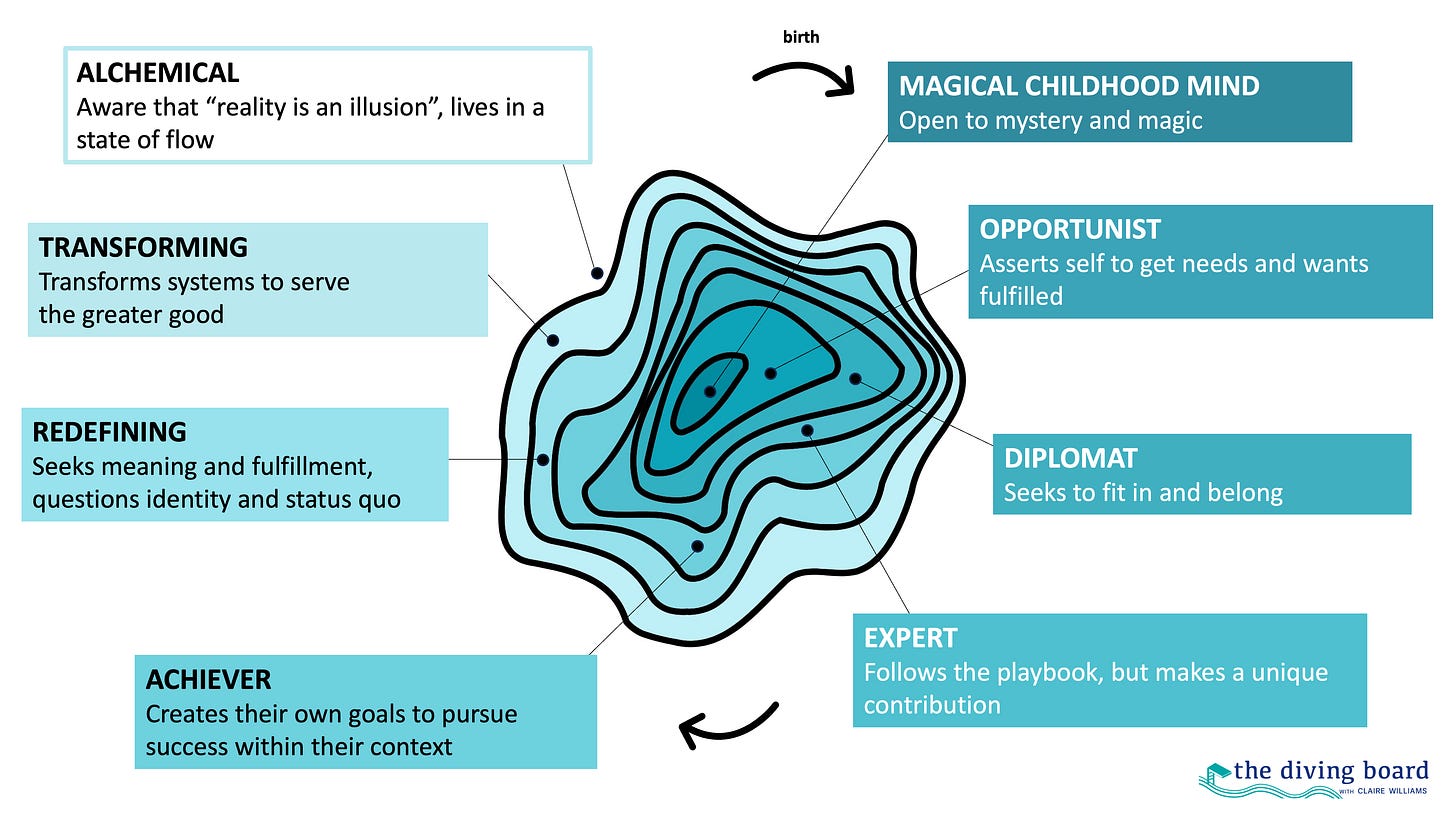The Stages of Vertical Development
The evolution of how we think and make meaning
Read my full series on Vertical Development here: Part 1, Part 2, Part 3
Vertical Development is the way our meaning-making changes over time, allowing us to see more, do more, and become more.
This development happens through a progressive series of Mindset Stages1. These Mindset Stages evolve what we value, how we see ourselves, how we interpret the world, and how much complexity we can handle.
Think of yourself as a territory on a map, starting out in the center, then crossing boundaries into new terrain. As you evolve through each Mindset Stage, you get to explore more of yourself and access capacities that have previously been hidden within you.
Keep reading for an overview of all the Mindset Stages, first at high level, then in more detail.

Emerges at Birth
Open to mystery and magic
GIFTS: Deeply connected to Life Source; Unity with other beings; Inherent sense of wholeness; Open to mystery and magic
LIMITATIONS: Unaware of individuality; Rational thinking is out of scope
For Example: A wide-eyed babe, completely dependent on mama and taking in the wonder of it all.
Usually emerges in Toddlerhood
Asserts self to get needs and wants fulfilled
Gifts: Aware of individuality and own needs; Acts on survival instinct to protect self
Limitations: Feels less whole and connected; Focused on threats; Can be selfish
For Example: That wide-eyed babe is now a red-faced tike screaming, “NO!” and “MINE!”
Usually emerges in Childhood
Seeks to fit in and belong
Gifts: Values group cooperation and belonging, complies with behavioral expectations
Limitations: Out of touch with own unique point of view; Follows rather than leads
For Example: Your school-aged niece wears horrendous “mom jeans” because apparently those are cool now?!?
May emerge in Teens or Adulthood
Follows the playbook, but makes a unique contribution
Gifts: Pursues individual mastery to contribute to goals of a group important to them; Committed to doing things the “right way” according to some authority or best practice
Limitations: Tends to see things in black and white; Unlikely to innovate or rewrite the rules
For Example: An early-career hire or seasoned team player who is eager to learn and get it right.
May emerge in Adulthood
Creates their own goals to pursue success within their context
Gifts: Creates, pursues, and executes own goals; Can rally others to achieve results
Limitations: Focus on success and individual achievement may prevent them from challenging status quo and connecting to deeper purpose; Risk of over-work
For Example: A leader or strong individual contributor intent on knocking it out of the park.
May emerge in Adulthood
Seeks meaning and fulfillment, questions identity and status quo
Gifts: Redefines success to pursue meaning and fulfillment over achievement; Questions the status quo; Can deal with abstractions and seemingly opposing viewpoints
Limitations: Can be overly absorbed by questions and less focused on action; May feel “lost” sometimes
For Example: A previously energetic high performer wonders if they’re burning out or having a mid-life crisis.
Rare; may emerge in mid-to-late Adulthood
Transforms systems to serve the greater good
Gifts: Significant release of ego and self-absorption; Serves the bigger picture; Navigates complexity; Transforms complex systems
Limitations: Can seem high-minded and out-of-touch to others – must tailor communication to help others act on their vision; Risk of arrogance
For Example: A wise leader who inspires others connect to the deeper “why”, and who seems unrattled by the usual corporate dramas.
Extremely rare; may emerge in mid-to-late Adulthood
Aware that “reality is an illusion”, lives in a state of flow
Gifts: Deeply connected to all life; Fully surrendered to “being” instead of “doing”; Serves the diverse whole of humanity in an “elder” role
Limitations: Difficult to relate to and understand; Loneliness resulting from having few peers
For Example: Ghandi, Jesus, Buddha…. Probably not you. ;)
Sources: The Mindset Stage language above was adapted from the work of Robert Kegan, Jennifer Garvey-Berger, Bill Torbert, Susanne Cook-Greuter, Nick Petrie, and Jan Rybeck. For a comprehensive list of resources, see here.
Jan Rybeck and Nick Petrie coined the term “Mindset Stages”










